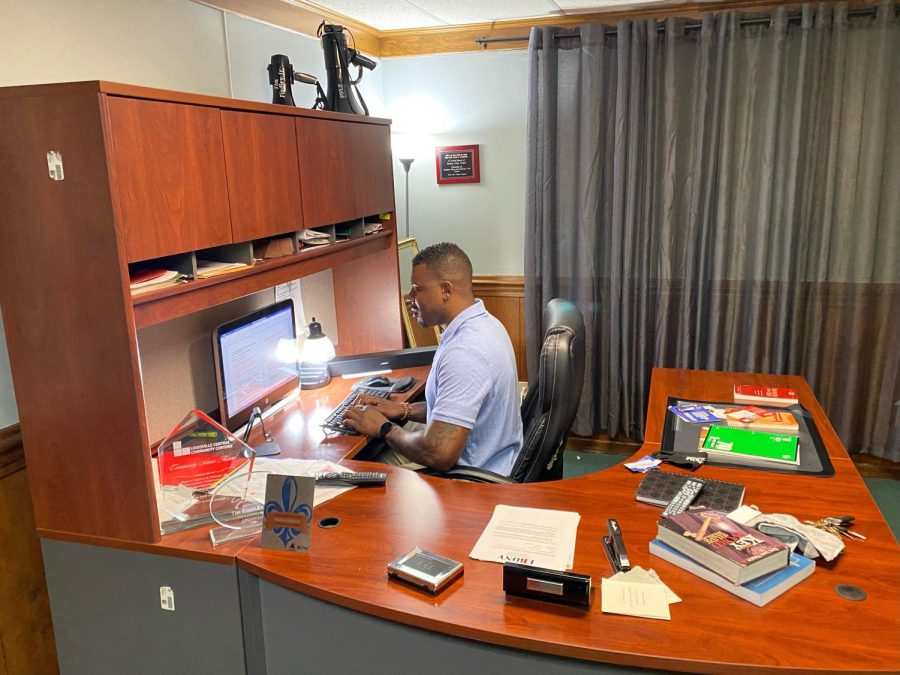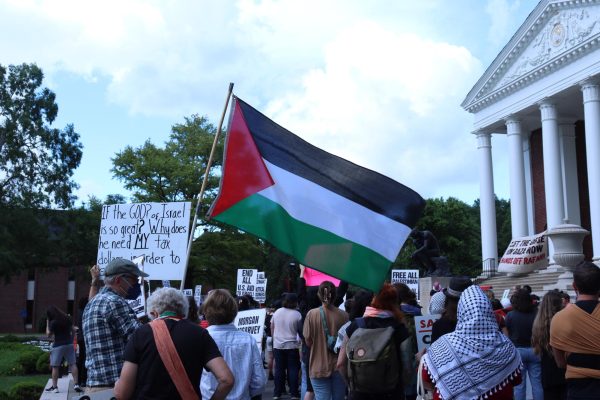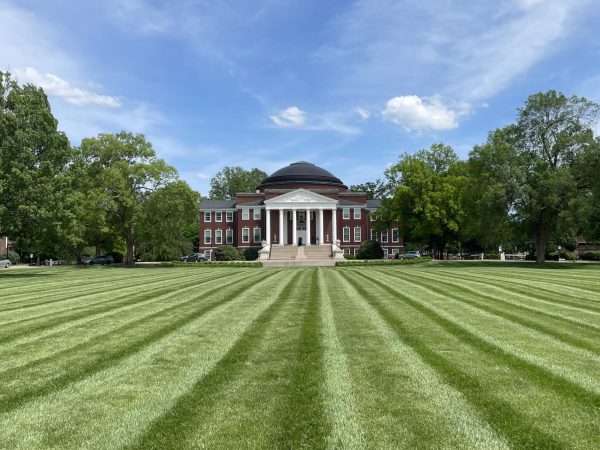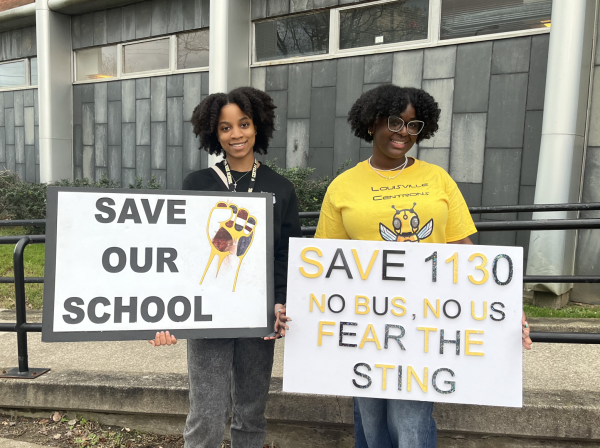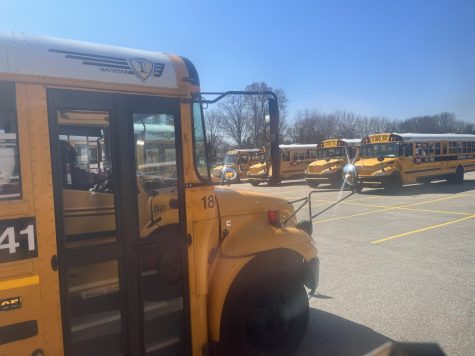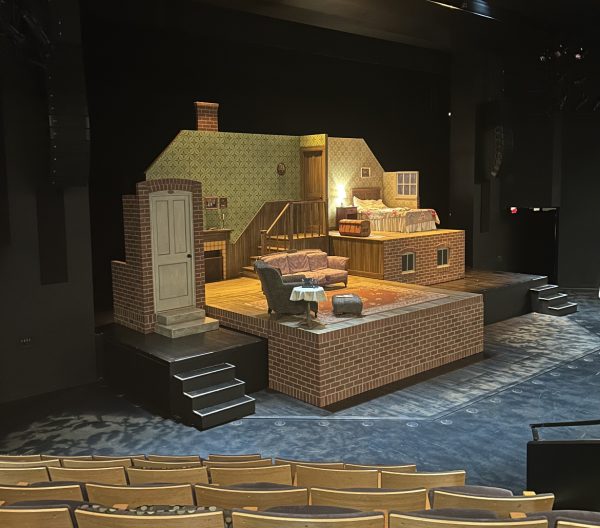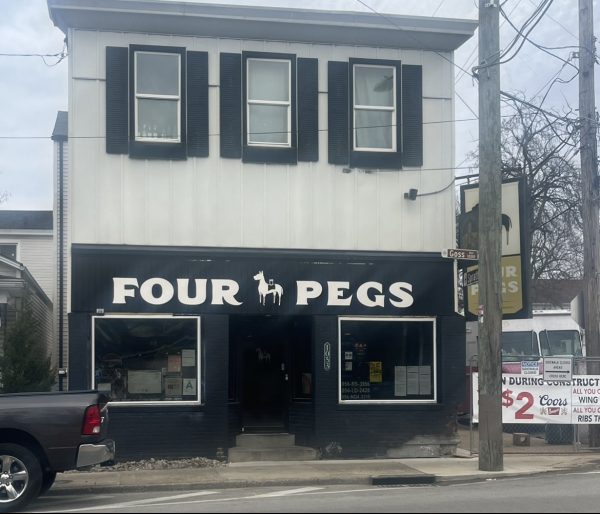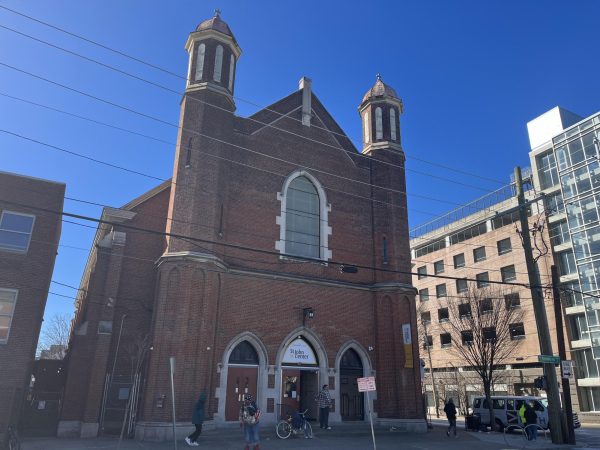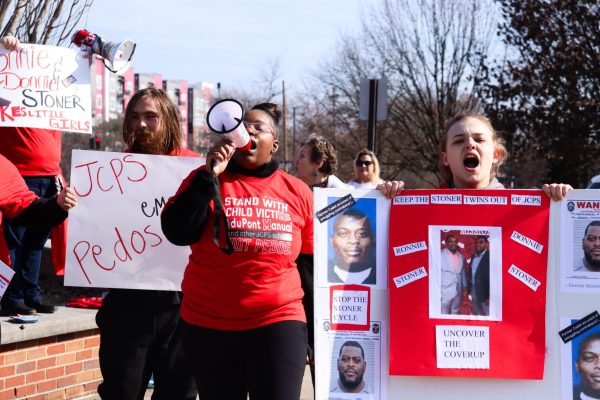Changing the narrative: Tim Findley’s historic run for mayor
Senior Pastor Tim Findley Jr. works in his office, which sits in the basement of his church. Photo by Brennan Eberwine.
May 13, 2022
Across from the Norton Healthcare Pavilion on Broadway and near the heart of downtown Louisville lies the modest, symmetrical Kingdom Life Fellowship Christian Life Center. Beneath the main floor lives the office of Senior Pastor Timothy Findley Jr., who is currently most well known throughout the city for his mayoral campaign. In a crowded field of Democrats and Republicans vying to be the next Mayor of Louisville, Findley hopes to be elected as the first Black man to hold the position and push through a bold agenda. I sat down with Findley to learn a little more about him and his plan for our city.
Findley has always had ambitions to run for office. He worked his way up through the community and eventually became the faith-based liaison in the Office of Safe and Healthy Neighborhoods for Louisville Metro and has also worked on Governor Andy Beshear’s transition team. His church was one of the first to host COVID-19 vaccinations, again further representing his commitment to community health and advancement. However, it wasn’t until the summer protests regarding police brutality and the murder of Breonna Taylor until Findley’s plan to run was truly set into motion.
“I had been reactive, reacting to bad leadership, reacting to bad policies and programs. And that if things are going to turn around, I wanted to be proactive. And that really was the sort of the beginning of the journey that I’m on now,” Findley said. The same day Daniel Cameron’s office decided not press charges, Findley decided his intent to run.
The large town, small city feel of Louisville is one that Findley is intimately connected with, having grown up in the Newburg neighborhood.
“It gives you a unique perspective, you know, you have a city that you care deeply about that you love, but also one that you are, you’re critical of how things have moved to this point,” Findley said.
The position of Metro Louisville Mayor is a relatively new one and only a few different individuals have held the office in the past 36 years. Jerry Abhramson, elected in 1985 and dubbed “Mayor for Life,” served for 21 years and current Mayor Greg Fischer has served 12 years. The lack of variability in this leadership role is a problem Findley believes has held Louisville back.
“I think that’s a part of the challenge that we’ve wrestled with in the city, is that we find people that we are comfortable with and then we’re just going to keep them in position forever. And it limits the brilliance and the creativity of up and coming people that can take it to the next level,” Findley said. He instead hopes to be an impactful mayor rather than a long-serving mayor.
Two of Louisville’s biggest issues for the next mayor to tackle are segregation and housing. Segregation is a well-known problem that is so severe, many can name an exact street that divides Black and White Louisville. Housing affordability compounds upon segregation, with 66% of West Louisville being composed of renters and a 10% jump in rents since 2019.
Findley sees this fight not just as a policy battle, but as a PR battle too.
“We’re all talking about affordable housing, but not every area wants affordable housing, because affordable housing is oftentimes synonymous with criminality. So we’ve got to deal with that narrative. One of the things that I want to do is to really start to tackle and tear down those walls of segregation,” Findley said.
One recent example of the stigma affecting the contruction of affordable housing is in the Prospect neighborhood, which ran into opposition from residents. The mayor of Prospect stated the project was, “incredibly massive and totally incompatible with anything around there.”He has threatened to sue over the public housing proposal. Prospect notably is one of the wealthiest communities in the state, with a median household income of $145,511 and a 88% white demographic. Resistance from predominantly-white, wealthy communities like Prospect is what has kept communities segregated and widened the divide between poverty and luxury.
Another narrative Findley wants to see changed is how Louisville’s public transportation system is viewed and runs. The Transit Authority of River City (TARC) currently only runs fixed bus routes and its ridership heavily skews towards lower-income households. Findley hopes to not only make the experience better for people who rely on TARC (cutting down delays, creating designated lanes for buses and even looking into light rail systems), but also make TARC something people want to use. The TARC has potential to be a catalyst for a greener, more connected city and could fix problems such as an empty downtown full of concrete islands of parking lots.
“In most progressive cities, people take advantage of public transportation. Well, we’ve got to rebrand TARC, we’ve got to make it more culturally relevant. We’ve got to make it more city relevant,” Findley said.
Surpassing segregation and public transportation and by far the biggest debate in the mayoral race surrounds the police. Louisville’s spike in gun violence, analogous with other cities across the country, has made policing a big issue for candidates.
Some candidates have proposed giving more funding to Louisville Metro Police Department (LMPD), a talking point Findley says has been re-used for years and isn’t working. Lawmakers shouldn’t be, “simply waiting until things are on an uptick in terms of violence, and then trying to throw them some ‘hurry up and fix the issue’ money. There’s some things we need to invest in and get a fundamental sort of approach to many of the issues that we’re seeing in the city.”
Findley’s convictions around policing run deep. In 2020, he used his church as a meeting place for activists and worked to turn their activism into political strength at the polls. He founded the Justice and Freedom Coalition, which has helped organize and lead dozens of non-violent protests and demonstrations. In a Vice documentary, “God’s Country,” Findley discusses his role as a pastor and as an activist trying to change the system from the outside. At times the work was dangerous and his life was threatened multiple times; but, despite the opposition he pressed on for change in Louisville. Now, as a mayoral candidate, he wants to work inside and lead the conversation instead of just responding.
The mayor should be, “someone who understands that a lot of people are dealing with a lack of hope. They’re dealing with conditions that have essentially deprived them from caring. And we’ve got to look at the fact that we’ve divested from neighborhoods, and look to reinvest in the neighborhoods” Findley said.
Louisville’s solution doesn’t lie in more policing, it lies in investing in prevention of “root causes.” Findley hopes to look at the city’s budget, something he believes is as much a fiscal document as a moral one, and invest in areas that have been neglected by the city in favor of LMPD. The Louisville Metro council approved the 2021-22 working budget, which allocates 47.3% of its general fund on Public Safety and gives LMPD a budget that outstrips every single other public service in the budget by $100 million. Findley wants to divert that money toward prevention and education, better funding services such as the Louisville Free Public Library system and giving money to nonprofits like Evolve502. Shifting focus from policing to prevention is the key to breaking Louisville’s cycle of violence.
Sometimes it’s difficult to remember that Louisville is a small blue dot in a sea of Kentucky red. The state’s government at large has been increasingly at odds with the city, such as passing laws that specifically target JCPS and the city’s plans. This blatant targeting has led many, including Findley, to say that the state legislature has declared a, “War on Louisville.”
“One of the things that I’m committing to doing is spending a lot of time in Frankfort. Is defending Louisville because Louisville is the economic engine of this state,” Findley said. Although it is unclear how much slack the General Assembly will give Louisville in the future, Findley says he’s committed to working with them if they’re willing to work with him.
The themes of Findley’s political career mirror his own defining characteristic: a cerebral, religious Louisvillian who has been an intricate part of the community and is committed to transforming the Louisville he knows in his mind into the Louisville of reality. He hopes by the end of his term, if elected, that he had, “set off a domino effect, the ripple effect of progress, forward thinking, equity in bold leadership in a way that the city’s never seen before.”
To achieve those goals requires a balance of policy and PR. I suggested the label “idealistic pragmatist” for Findley, to which he agreed.
In that windowless yet boundless room in the Kingdom Life Fellowship Christian Life Center’s basement, accented with children’s voices echoing in the halls, I could feel the magnetic conviction Findley has in his beliefs that drove him to run for mayor. That magnetic force could be what takes him from Broadway to Jefferson Street, right across from Jefferson Square where he made the decision to run and change the narrative in Louisville.


